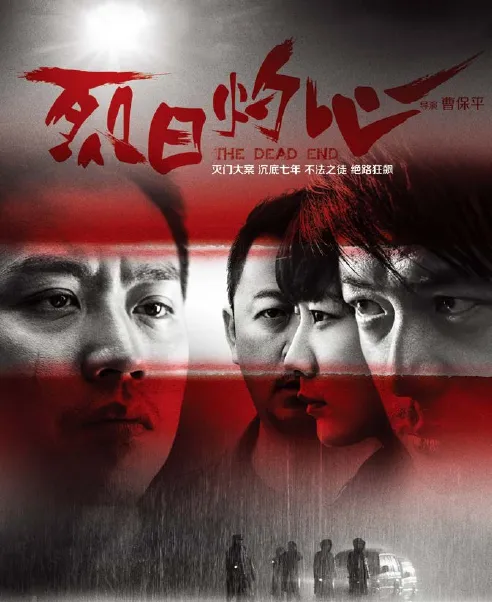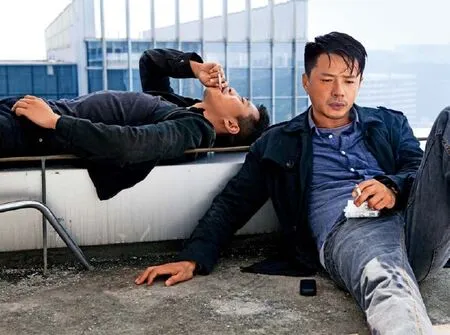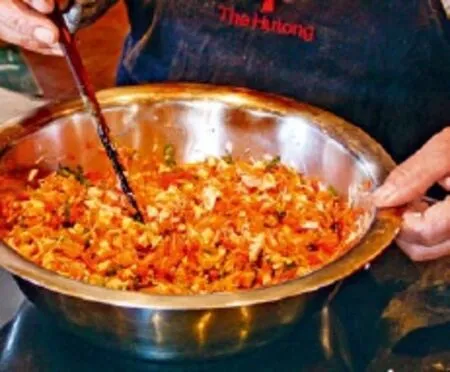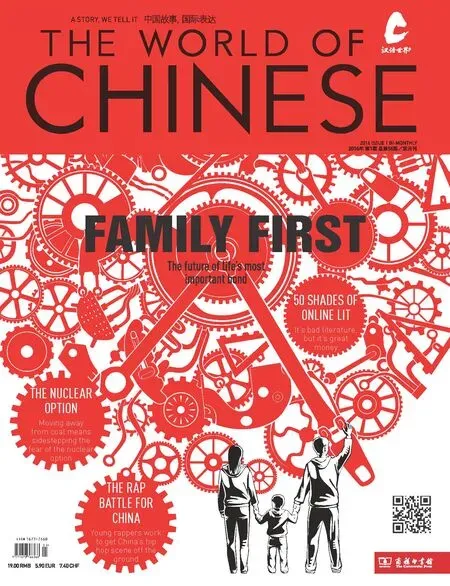The dead end
2016-09-12
The dead end
《烈日灼心》Li- R# Zhu5 X~n
director: Cao Baoping

writers: Cao Baoping, Jiao Huajing Tao) keeps his head-down, secretly performing deeds of kindness and atonement, and Chen Bijue (Gao Hu) plays a mentally-challenged man who cares for the three men's adopted daughter, Tail. The final protagonist, Captain Yi Guchun (Duan Yihong) is a world-weary cop who can't give up on the case and serves as Xiaofeng's partner, arguably turning in the film's strongest performance, of which there are many.
A certain anxiety often hangs in the air when a film is based upon a book, and the screenplay for The Dead End is based on the 2010 novel Sunspots(《太阳黑子》), by Xu Yigua(须一瓜), a journalist who spent many years as a crime reporter for the Xiamen Evening News. The original novel revolves around a trio of close friends who desperately try to atone for a horrific crime they committed ten years previously by adopting the daughter of one of the victims.
The film sticks closely to the format and from the outset it is clear that Cao is trying to go a bit beyond the conventional and is a director of real talent-his
any film that that makes you sympathize with a man that rapes a woman to death has achieved something out of the ordinary, and, odd as it sounds, Cao Baoping's The Dead End does exactly that-a tight genre thriller that reaches for something far more than the sum of its parts. The film's bleak, black and white mise en scene grabs viewers' attention. It shows three panicked men scrambling down a hillside side in the midst of storm, fleeing the remote scene of a quintuple murder and a brutal rape.

Xin Xiaofeng (deng Chao) and Yi guchun (Duan Yihong) smoke on a rooftop after finishing their last mission
The level of their involvement in the crime is unclear, but things certainly don't look good for them; an omniscient narrator chimes in telling us that these men "must shed their skins" and start anew. Fast-forward seven years and the trio are living in a manner that can only be defined as quietly seeking redemption: Deng Chao plays Xin Xiaofeng, a nervous auxiliary policeman who refuses promotion; his friend, taxi driver Yang Zidao (Guo cinematography is sharp, making ample use of shaky, handheld camerawork, giving the film a hardedged cinéma vérité style. Meticulous attention seems to have been paid to lighting, décor, and costume. The liberal use of jump-cutting accompanied by a pacing that deftly jumps between that of a bum-on-edgeof-seat, speedy, taut thriller and a slower, more intense philosophically brooding film means this slick picture has several different gears to go through. The film manages to hold you for all of its two hours and moreno mean feat in these times of illattention.
Though a fine film, there are more than a few things that do detract from it: there are a couple of moments of slightly slapstick comedy which feel intensely out of place in what is otherwise a serious engaging murder mystery chasing still grander themes; Guo's restrained acting is occasionally spoiled by his having an underwritten
Xing Xiaofeng: Hello?
W-i?
喂?
Chen Bijue: Tail fell. She's not talking. She peed, had a seizure.
W0iba shu`id2o le, b& shu4hu3. H1i xi2obi3n, ch4uj~n.
尾巴摔倒了,不说话.还小便,抽筋.
Xin: Is she dizzy again?
Sh# b% sh# y7u y$n a?
是不是又晕啊?
Chen: Not dizzy. Seizure. Not talking. Not waking up. The doctor won't let me talk. You have to come.
B& y$n, ch4uj~n, b& shu4hu3, h2n t` y0 b& x@ng. Y~sh8ng b& g0i w6 shu4. N@men d0i gu7l1i, xi3nz3i ji& d0i gu7l1i.
不晕,抽筋,不说话,喊她也不醒.医生不给我说.你们得过来,现在就得过来.
Xin: Stop yelling. I'm coming over.
N@ bi9 h2n bi9 h2n, w6 m2sh3ng gu7l1i.
你别喊别喊,我马上过来.
Yi guchun: I'm sorry, Feng. I have to do this.
Du#buq@, Xi2of8ng, w6 b#x$ zh-me zu7.
对不起,小丰,我必须这么做.
Xin: No need to apologize. Right and wrong, we all have them.
M9i sh9nme du#buq@ de. Du# h9 cu7, m0i g- r9n x~nli d4u y6u.
没什么对不起的.对和错,每个人心里都有.
Yi: I will let Xia bring Tail home. I'll take care of all the surgery. Do you hate me ?
W6 hu# r3ng Xi2oxi3 w2nshang b2 W0iba ji8 hu!l1i. H7umi3n de sh6ush&, w6 hu# `np1i. N@ h-n w6 ma?
我会让小夏晚上把尾巴接回来.后面的手术,我会安排.你恨我吗?
Xin: It's torture. In fact, we've been waiting for today. You wouldn't understand.
T3i ji`n'1o le. Q!sh! w6men, w6men d4u z3i, z3i d0ng zh- y# ti`n. Y0x^ n@ b&n9ng l@ji0.
太煎熬了.其实我们,我们
都在,在等这一天.也许你不能理解.love interest unnecessarily shoehorned into the film. Wang Luodan's (as Yi Guxia) merely adequate performance looks much worse than it is when measured against the superb award-winning male turns around her. And, the reason for the trio's involvement in the murders is never fully explained, which, of course, weakens our journey with them on their road to redemption as we are never quite sure how much they need to be redeemed in the first place.
A few months before the film's release, actor Gao Hu was arrested on drug charges and consequently many of his scenes where unnecessarily edited out, thus giving the unholy triptych of Xiaofeng, Zidao, and Bijue an uneven feel; it would have been interesting to see the original edit. A couple of times in the film we have sight of Xiaofeng grasping another man's hand, barely saving a man from falling a great height from a building. For such a trope to appear just once in a movie feels trite, but twice? There also a few plot-holes that this reviewer has been unable to redress.
However such gripes do not do too much damage to a film which has far more pluses than minuses. And it deals directly with things in a way that the Chinese film industry, ever wary of censorship, usually cannot handle: clunky on-message moralizing is almost completely avoided; we get (not particularly graphic) scenes of homosexual sex dealt with in relatively straightforward manner; and the film, arguably, challenges the nation's policy of capital punishment through a bold denouement showing the Chinese authorities administering the death penalty via lethal injection. Cao clearly has no issue challenging taboos, and you are left hoping that he continues to make challenging films rather than going down the path of the commercial mainstream that so many directors walk down once they have had moderate success with early more engaging and artistic content. him. It is this constant and probing look into such contradictions that elevate the film beyond its mere status of genre thriller and, instead, almost makes it a Dostoyevskian study in the nature of crime and punishment.

Xin Xiaofeng, a police officer, putting handcuffs on a suspect
Actor performances are always controlled and rarely overdone, yet the internal tension and anxiety of the characters is fully felt: Guo, Deng, and Duan deserve to share the best actor award at the Shanghai International Film Festival, showing that, with the right direction, Chinese actors can turn in very fine performances indeed. For too long contemporary mainstream Chinese cinema has done little to add to the oeuvre of modern filmmaking, offering the blandest of scripts, over-simplistic messages, and a reliance on special effects that for all their costs still look cheap and illadvised-all effectively adding up to a stream of second-rate copies of the very worst kind of Hollywood movies. Cao shows that if allowed to stretch a little (always that if), Chinese cinema easily has the capacity to make taboo breaking, finely acted, challenging films for a regular audience. No one is going to put The Dead End down as an absolute high point of Chinese cinema, but it more than punches its weight as an original, entertaining, and occasionally even thought provoking genre flick.
The film's high-points rests in two main areas: genuinely restrained and meaningful performances from the film's protagonists and an outright refusal to judge its characters whatever their crimes may or may not have involved. In what could have so easily been a tired goodies versus baddies film, with everything wrapped up cleanly, Cao instead achieves something that is much more nuanced, and though the film's premise is hardly a new one: that man is neither good nor bad but that a degree of both good and evil resides in all of us. The way it goes about exploring this through a subtle examination of the fragile psychology of its characters and the interrelationships between them is fully realized.
Though suspicious of Xiaofeng, guilt constantly simmers within Yi, all boiling to The Dead End crescendo of the film's title, the scenes between them, while not quite in True Detective territory, are beautifully wrought and we feel Yi's confusion as he starts to realize that, for whatever Xiaofeng's sins might be (and the constant suggestion is that they are of the worst possible kind), he has at the same time deep reserves of complexity, bravery, and loyalty residing within
- carloS oTTery
occasionally, new visitors make the mistake of thinking Chinese aren't devout carnivores; after all, China has a pretty long history of Buddhism. But no, most Chinese love their meat. Even the sage himself, Confucius, was a meat-loving foodie and stated his meat preferences in the book The Analects (《论语》). Frequently quoted as a unique perspective on culinary culture, Confucius said, "Rice can never be too refined and meat can never be minced too finely (食不厌精,脍不厌细)." According to this principle, the Chinese meatball, or wanzi (丸子), is the gold standard. But, even if your morality or religion won't let you enjoy the taste of meat, there's no need to forego the delicacies of the wanzi. As always, tofu is the best substitute for the meat. Together with sliced carrots and starch noodles mixed with wheat flour and eggs, the tofu-made Beijing-style vegetarian wanzi has a fresh flavor, perhaps fresh enough to fool a few meat-lovers.
As a Beijing snack, the veggie wanzi has to be served and eaten hot. Crispy on the outside, tender and fresh on the inside, when your teeth bite into this golden ball, you could swear it was cooked with the finest dead animal, but you can rest easy and chew that tofu to your heart's content.
Even with the veggie option, the Chinese meat ball is in a whole different ballpark when compared to, say, IKEA meatballs. Like just about every other Chinese dish, there is more than one recipe for wanzi. Frying, quick-boiling, stewing, red-braising-each method brings its own unique taste. Because of these different cooking methods, meatballs are divided into different categories.
Most folk might not know the difference between the "lion's head"(狮子头)" and the "wanzi", but the key is in the cooking: red-braised and stewed ones belong to the lion's head category and the fried and quick-boiled are wanzi. A lion's head meatball is as big as a human fist, but the wanzi is much smaller; some others even focus on geographical difference, saying that the southern meatballs are lion heads and the northern ones are wanzi. There is no conclusive answer.
The only thing that really matters is flavor. In true Beijing style, you're gonna want cute little meatballs deep fried to a delicious golden finish.
– Sun jiahui (孙佳慧)
A bit of carrot, coriander, and tofu will give you the meat experience
来一盘金黄脆香的炸素丸子,咂摸纯正的老北京风味
BeIjIng-style VeggIe MeAtBAlls

200g
Tofu
豆腐
200g
carroT
胡萝卜
120g
flour
面粉
500 ml vegetable oil 油
100g coriander 香菜
30g starch noodles 粉丝
1 egg 鸡蛋
1tsp salt 盐
1/2 tsp sugar 糖
1/2 tsp white pepper powder白胡椒粉

Finely grate the carrot and chop the coriander. Pre-soak the starch noodles in cold water for an hour until they turn soft and then cut them into small pieces.

Cut the tofu into slices and then into small cubes.

Wrap the tofu cubes with a piece of gauze and then press the water out.

Mix the carrot, coriander, starch noodles, and tofu pieces with egg and flour. Add salt, sugar, and white pepper powder. Mix them well.
Roll the ingredients into small balls.

Heat the oil to a boil and deep fry the balls until they turn golden. Usually ten to 15 seconds will be enough.

Remove the balls and drain them on oil-absorbing kitchen paper, then serve hot.
